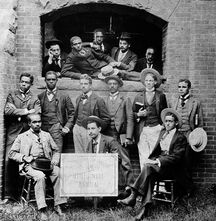 Howard University has announced that it is offering the sale of reproductions of 46 items from its collections of artwork and photographs. The items are from the collections of Howard’s Gallery of Fine Art, the Moorland Spingarn Research Center, and the School of Divinity.
Howard University has announced that it is offering the sale of reproductions of 46 items from its collections of artwork and photographs. The items are from the collections of Howard’s Gallery of Fine Art, the Moorland Spingarn Research Center, and the School of Divinity.
Included in the items now up for sale are reproductions of historical photographs and artwork by such artists at Henry O. Tanner and L.P. Spinner. Proceeds from the sale of the reproductions will be used to support the art collections.
One of the 46 items, shown here, is a photograph of members of the Class of 1896 at the university.
The online store for these reproduction can be found here.









